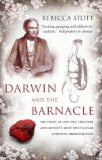 Darwin and the Barnacle
Darwin and the Barnacle
by Rebecca Stott
Faber, £14.99, ISBN 0571209661
What happens when someone brought up as a strict Christian fundamentalist abandons her faith and writes a book about Darwin? Not as much as you might imagine. As the title indicates, Darwin and the Barnacle resolutely avoids controversy by concentrating on Darwin’s obsession with this humble sea-creature.
Every student has heard the cliché that Darwin concentrated on barnacles to avoid finishing his work on human evolution. Stott emphasizes that Darwin’s barnacle studies contributed to the development of his evolutionary theories, enabling him to refine his scientific methodology, and making him a respected member of the scientific community. Stott sheds some interesting light on the idiosyncrasies of Darwin’s colleagues and predecessors. Anyone who thinks their own life is boring should compare it with that of early nineteenth century biologist Robert Grant, who spent five years obsessively studying and dissecting sea sponges before proudly announcing that he had watched a sea-sponge excrete continually for five hours.
Victorian medicine could be equally bizarre. Darwin underwent the ‘water cure’ invented by Dr Gully (who later became notorious as a result of the Bravo poisoning case). This involved clairvoyance, mesmerism and several weeks of such strange rituals as being wrapped in cold wet bedsheets for hours on end. It must have done Darwin some good. While in Gully’s Malvern nursing home, separated from his beloved barnacles, he fathered his seventh child. Darwin’s barnacles took over his life for many years.
Stott does her best to account for this, and to interest the reader in Darwin’s obsession. Darwin and the Barnacle is scholarly, well-researched and highly readable – which is more than can be said for many recent academic tomes. But you have to very interested in either Darwin or barnacles to read it.



